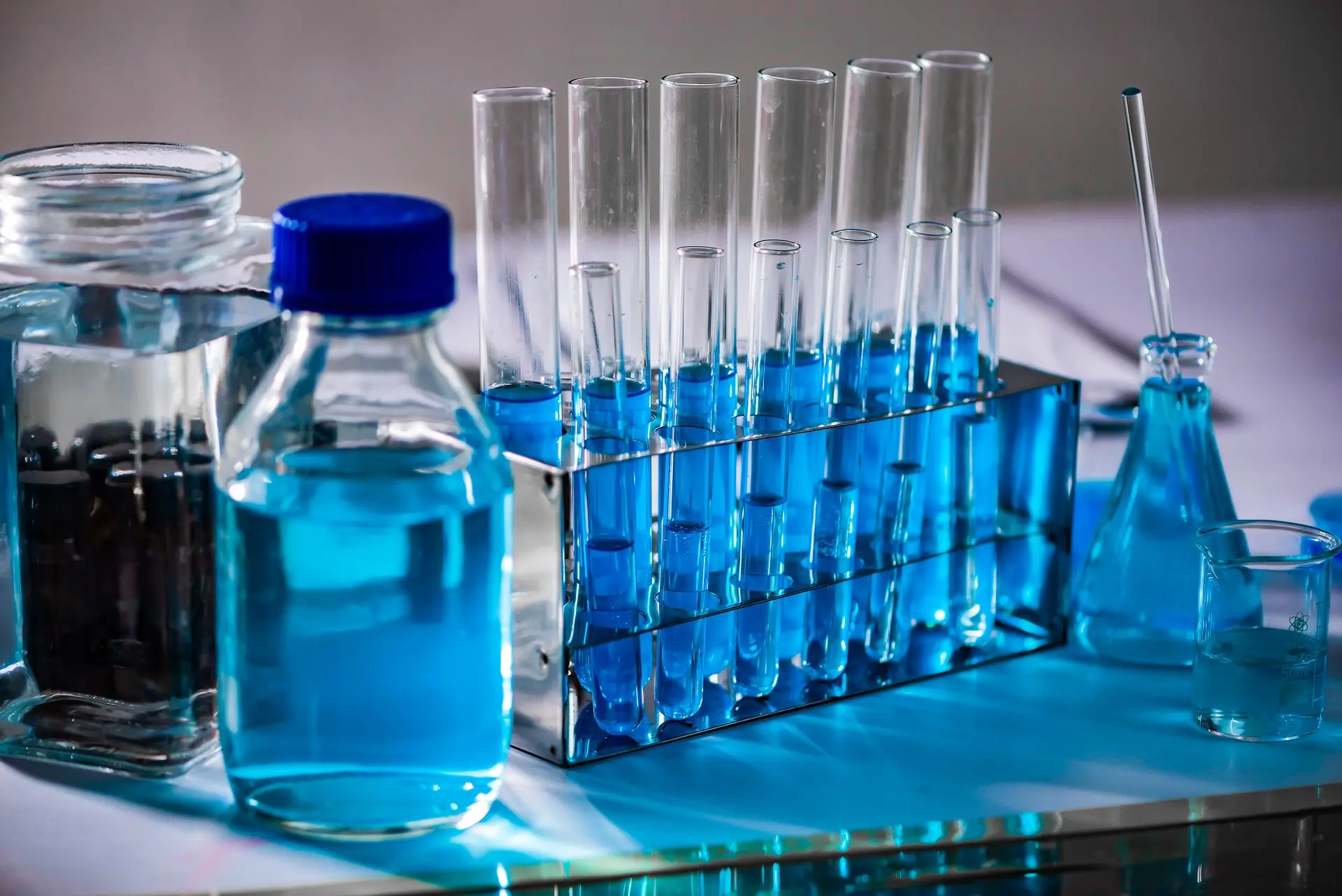Connecting Small Molecule Science with the Future of Biotechnology
"Connecting Small Molecule Science with the Future of Biotechnology”
CoSMoScience : bridge between small molecule science and biotechnological innovation
Biotechnology Research And Development
At CoSMoS, we are proud to expand our mission beyond small molecule characterisation into the dynamic field of Biotechnology Research and Development (R&D). Our goal is to harness the power of chemical and biological sciences to address pressing global challenges in healthcare, agriculture, environmental sustainability, and beyond.
Building on our strong foundation in analytical techniques and molecular analysis, our biotechnology R&D efforts focus on developing innovative tools, technologies, and applications that bridge the gap between chemistry and biology. We are particularly interested in areas such as
Targeted dr ug discovery and delivery systems
where small molecules are engineered to modulate specific biological pathways.
Molecular diagnostics and biosensors
using biochemical markers and nanostructured materials for early and accurate disease detection.
Synthetic biology and metabolic engineering
creating new biological systems or enhancing natural ones for production of valuable compounds.
Bioprocess development
improving the efficiency and scalability of biologics manufacturing using real-time analytics and process monitoring.
Through interdisciplinary collaborations with academic institutions, biotech companies, and regulatory agencies, we aim to foster a robust innovation ecosystem. We are also committed to integrating data-driven research, incorporating AI and bioinformatics to accelerate discovery and streamline validation.
This strategic move into biotechnology reflects our belief that the convergence of small molecule science and biological innovation is key to the next generation of scientific breakthroughs. At CoSMoS, we envision a future where our R&D not only deepens scientific understanding but also translates into practical solutions that improve lives, protect the environment, and shape the future of medicine and industry.
The Strategic Role of Bioanalytics in Modern Biotechnology
Bioanalytics serves as a foundational discipline in the biotechnology landscape, enabling the precise measurement, monitoring, and validation of complex biological systems. As biotechnology expands into personalized medicine, gene therapy, synthetic biology, and advanced diagnostics, the demand for accurate and high-throughput analytical tools continues to grow. Techniques such as mass spectrometry, high-performance liquid chromatography (HPLC), ELISA, and nucleic acid quantification play a vital role in assessing the identity, purity, and activity of biological compounds. These methods are indispensable in understanding pharmacokinetics, detecting biomarkers, and supporting regulatory submissions ensuring safety, efficacy, and consistency across the biotech development pipeline.

Synthetic Biology: Engineering Life at the Molecular Level
Synthetic biology combines biology, engineering, and computational design to build or reprogram biological systems with precision and predictability. By applying engineering principles like modularity and standardization, it allows scientists to design genetic circuits and biological parts that can perform specific, controllable functions inside living cells.
This approach treats DNA sequences as standardized that can be assembled to create new biological behaviors, such as switching genes on or off, sensing environmental signals, or producing useful molecules. Using computational tools, researchers can model these systems before building them, improving accuracy and efficiency.
Synthetic biology’s ability to create programmable living systems is driving innovations in medicine, agriculture, and industry by enabling the development of targeted therapies, improved crops, and sustainable biomanufacturing processes.
Designing and Constructing Biological Systems
Designing and constructing biological systems involves assembling standardized genetic parts such as promoters, coding sequences, and terminators—into synthetic gene circuits that precisely control cellular functions. These well-characterized modules, often called BioBricks, enable predictable and modular engineering of biological behavior.
Advanced genome editing tools like CRISPR-Cas9 allow for accurate, targeted modifications of DNA, enabling insertion, deletion, or alteration of genes to create organisms with new or enhanced functions. This precision engineering supports the development of cells that can produce novel proteins, sense environmental signals, or perform complex tasks.
Metabolic engineering further optimizes cellular pathways by modifying enzymatic steps and fluxes to increase the production of valuable compounds like biofuels and pharmaceuticals. Computational models and iterative design cycles guide this process, enhancing efficiency and reliability. Together, these approaches empower synthetic biology to build sophisticated living systems tailored for medicine, industry, and environmental solutions.

The Role of Quality Control in Biopharmaceuticals
Biopharmaceutical quality control is a cornerstone of modern therapy and manufacturing, ensuring that biologic medicines consistently meet predefined standards of safety, efficacy, and quality. Unlike biopharmaceuticals such as monoclonal antibodies, vaccines, gene therapies, and cell-based products are large, structurally complex molecules produced through living systems. Their complexity makes them highly sensitive to variations in the production process, environmental factors, and storage conditions. Quality control thus encompasses a comprehensive framework of testing and monitoring across all stages from raw material qualification to final product release to maintain the integrity of these delicate molecules and ensure therapeutic performance.
Advanced Analytical Techniques
Quality control of biopharmaceuticals utilizes a diverse arsenal of cutting-edge analytical technologies. Chromatographic techniques like high-performance liquid chromatography (HPLC) and ultra-performance liquid chromatography (UPLC) are employed to separate and quantify individual components and impurities. Mass spectrometry provides detailed molecular weight and structural information, crucial for confirming product identity and detecting subtle modifications. Electrophoretic methods, including SDS-PAGE and capillary electrophoresis, assess protein purity and heterogeneity by analyzing size and charge variants. Functional bioassays evaluate the biological activity or potency of the product, confirming that it performs as intended in a biological system. This combination of structural and functional analyses enables comprehensive quality assessment, critical for meeting stringent regulatory expectations.


Maintaining Safety and Compliance
Ensuring patient safety and regulatory compliance is paramount in biopharmaceutical quality control. Regulatory agencies such as the FDA, EMA, and ICH provide detailed guidelines that define critical quality attributes, acceptable impurity levels, potency thresholds, and stability requirements. Quality control processes are designed not only to verify that products meet these standards but also to detect deviations early through in-process monitoring and release testing. Advanced statistical tools and risk management strategies help identify potential quality risks and establish robust control measures. Compliance with these regulations guarantees that only products demonstrating consistent safety and efficacy are distributed, thereby protecting patients and upholding public health.

Quality Control as a Pillar of Trust
Robust quality control processes are essential for maintaining trust among healthcare providers, patients, regulators, and manufacturers. As biopharmaceuticals transition from small-scale laboratory settings to commercial-scale production, maintaining product consistency and reliability becomes increasingly challenging. Quality control ensures reproducibility in manufacturing processes, mitigates batch-to-batch variability, and verifies long-term product stability. This foundation of trust supports the adoption of innovative therapies by clinicians and patients, facilitates regulatory approvals, and underpins the commercial success of new biopharmaceutical products. Ultimately, high-quality control standards empower the biotechnology industry to deliver transformative treatments that address unmet medical needs worldwide.